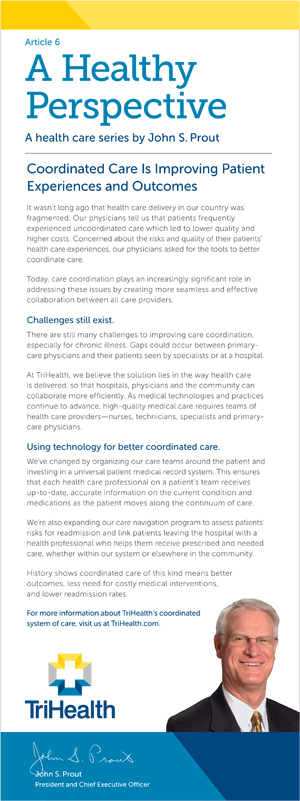Coordinated Care is Improving Patient Experiences and Outcomes
It wasn’t long ago that health care delivery in our country was fragmented. Our physicians tell us that patients frequently experienced uncoordinated care which led to lower quality and higher costs. Concerned about the risks and quality of their patients’ health care experiences, our physicians asked for the tools to better coordinate care.
Today, care coordination plays an increasingly significant role in addressing these issues by creating more seamless and effective collaboration between all care providers.
Challenges still exist.
There are still many challenges to improving care coordination, especially for chronic illness. Gaps could occur between primary-care physicians and their patients seen by specialists or at a hospital.
At TriHealth, we believe the solution lies in the way health care is delivered, so that hospitals, physicians and the community can collaborate more efficiently. As medical technologies and practices continue to advance, high-quality medical care requires teams of health care providers—nurses, technicians, specialists and primary-care physicians.
Using technology for better coordinated care.
We’ve changed by organizing our care teams around the patient and investing in a universal patient medical record system. This ensures that each health care professional on a patient’s team receives up-to-date, accurate information on the current condition and medications as the patient moves along the continuum of care.
We’re also expanding our care navigation program to assess patients’ risks for readmission and link patients leaving the hospital with a health professional who helps them receive prescribed and needed care, whether within our system or elsewhere in the community.
History shows coordinated care of this kind means better outcomes, less need for costly medical interventions, and lower readmission rates.
